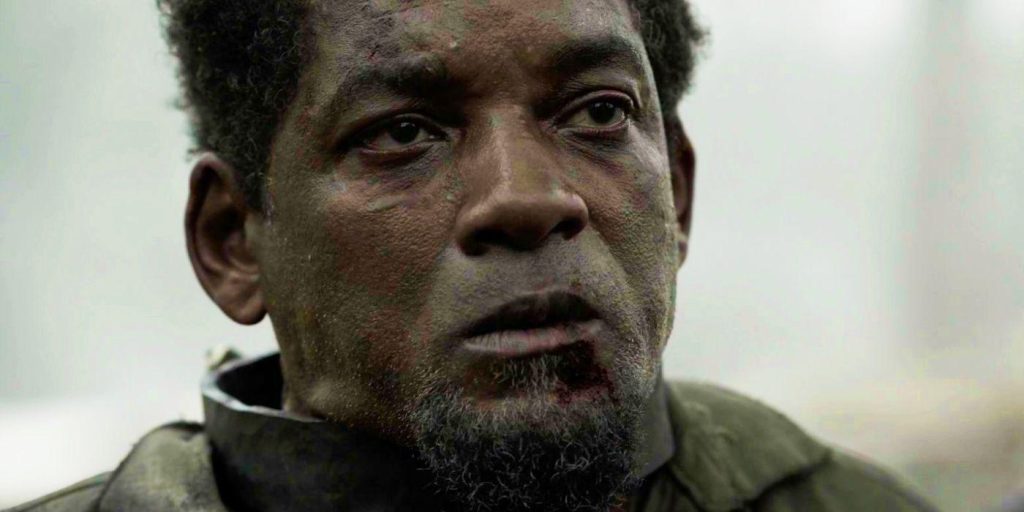Job Sikhala is Whipped Peter in the story of his own life

“I fight them. And they beat me. They whip me. They string me up. They sell me. They throw me down a well. They pull me out and beat me again. And I fight them again. They cut me. They burn me. They burn my neck. They burn my feet. They break the bones in my body more times than I can count. But they never, never break me.”
These are the words of the character of Peter Willis in the Hollywood film “Emancipation”, a 2023 production which has been described by critics as one of the most important pictures of the year.
Played by Oscar winning actor Will Smith, Peter is a portrait of human suffering and resilience all in one frame. The story is inspired by the true-life happenings of a slave named Peter, who rose to prominence after pictures of his severely scarred back due to whipping were published in Harper’s Weekly magazine in 1863. The photographs were taken as part of a campaign to spotlight on the brutality and barbarism that was slavery and it served as an important reference and rallying-call to the abolitionist movement.
Separated from his family and forced to labour on a massive railway building project, a hurting Peter but indefatigable Peter shouts a bold assurance to his devasted wife Doddienne (played by Charmaine Bingwa) and their three children; “Stay together. I will come back for you! I will come back for you!”
The spirit of wanting to unchain himself from the traumas of slavery and rejoining his family will soon push him into seizing the slightest available opportunity to make a run for it. He must escape to Louisiana via a vast swampland filled with treacherous water and all kind of inimical fauna and flora, not to mention antagonistic human beings.
With his slavers in hot pursuit and determined to catch him and whip the skin off his back gain, or even kill him, Peter becomes the most wanted runner across the state. After putting up a good fight to survive all this bulwark of adversity stacked against him, Peter finally crosses the swamp and subsequently joins the Union Army where he is presented with the opportunity to fight for his freedom, his emancipation from the shackles of bondage.
The film is a grey pill to swallow, in every sense of it. Apart from the depressing storyline which has you curled over your bowels as it unfolds, the film is grey and gritty in aesthetic tone. With absolutely no colour, the whole landscape is muted and gritty. This desaturated colour palette was a deliberate choice by the makers of the film. It served as a backdrop of Peter’s depressing world, and makes one relate with the torment he is going through.
JOB SIKHALA: Each time I watch that film (I watch excerpts of it over and over) I can’t help bring to comparison the story of Whipped Peter with one Job Sikhala’s.
Job “Wiwa” Sikhala is a Zimbabwean opposition politician and former legislator who got arrested in June 2022 on charges of inciting political violence. He has been in remand prison since; five hundred days and counting. The circumstances of his arrest are not going to be the subject of this article. The subject will be around the long prison detention, which has been described by some commentators as “unusual”.
Since he was arrested, Sikhala has been before the jury a countless time, and at each appearance, bail has been denied. This beside the fact that bail is a constitutional right to every accused person based on the principle that they are innocent until found guilty after a full trial. In denying bail, the state cites habitual offending on the part of Sikhala as the reason for withholding that fundamental right from him. He has been described by Prosecution as having a propensity to commit crime.
His legal counsel argues that, in the contrary, it is the state that has the propensity to arrest Sikhala. With over seventy arrests slapped on his wrists since the beginning of his political career, and zero convictions for all these, his lawyers’ reason that their client is just a victim of political persecution, targeted for his activism in the opposition trenches. On the other hand, the government denies the claim of there being political prisoners in Zimbabwean jails, Sikhala’s case included. Recently, Justice minister Ziyambi Ziyambi was quoted as saying Sikhala’s case was purely criminal and required no special intervention outside the courts process as no citizen is above the law.
But in a strained democracy like Zimbabwe, it is difficulty to picture the arrest of a political figure, worse so from the opposition, as not motivated by politics. The culture of using arrests and detentions dates to the pre-democratic era of Rhodesian minority rule. Early nationalists and freedom activists of that time were subjected to arbitrary arrests and long detentions as a way of stifling dissent. This culture, tragically, got imported into the post-independence dispensation and has been a convenient tool to punish and silence dissenters and alternative opinion up to this day.
The incarcerated Sikhala recently “celebrated” his 51st birthday, his second birthday in detention. Prior to that, there were reports of him being unwell and in need of medical examination. This was one of the several health scares the politician has gone through during his long detention. However, Sikhala remains in positive spirits notwithstanding these challenges.
In one of his update letters to his supporters and sympathisers , Sikhala oozed positivity and resolve in his tone; ” It is only after extreme grief that the greatest joy can come”, he wrote, quoting Malcom X.
He went on to describe prison as ” not a dungeon of shame, but the haven of freedom and human dignity”.
Such display of mettle and temerity in the face of hardship is legendary, the kind of character we read and watch in biographies of extraordinary personalities who walked this earth long before us. Indefatigable characters who remained alive against all odds for the sake of a cause, like Peter in the movie “Emancipation”.
SIKHALA AS WHIPPED PETER: Locked away in dark solitary confinement with no hope for freedom in sight, Sikhala finds himself playing the protagonist role in the story of his own life.
His story has so many resemblances to Whipped Peter’s. His countless arrests, detentions and tortures can be compared to the deep lacerations and scars on Peter’s back, all because of the countless times the hideous whip licked his back. In this context, the law ( the selective application of it)becomes the whip cracking on Sikhala’s back, whipping him again and again.
The gritty, grey, dark and stained walls of his prison cell can be juxtaposed with the desaturated colour of the film, which highlights the magnitude of depression and torment being borne by the protagonist.
His wife and children, just like Peter’s in the film, continue to endure the pain of going through day to day life without the support of a father, and yet, they keep hope from blowing out in the gust by huddling together and remaining optimistic.
His many health scares, and the psychological trauma he continues to endure in pre-trial detention can be equated to the danger-riddled journey Peter went through across the swamp in his bid to escape to Louisiana.
The closing image of the film is one sodden in emotion. Peter is reunited with his family, and they tightly embrace each other and never let go. This is the moment they have remained alive for, the moment of emancipation.
It is this scene that’s missing in Job Sikhala’s story for it to conclude, like Peter’s in Emancipation. The long expected happy ending, as is the norm in stories of this kind. Maybe Sikhala’s story will end in a different way. Maybe there is a surprise for us in the final minute. Maybe the story will never end; it will keep rolling and rolling into perpetuity, like a soap opera?






